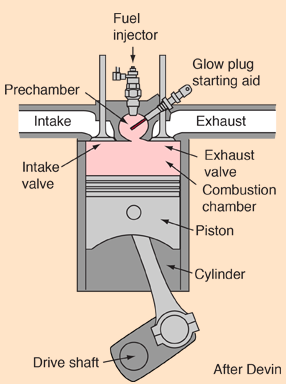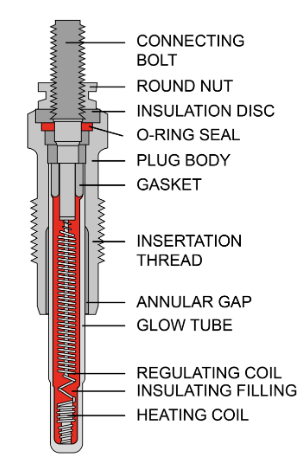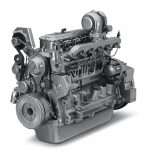Unlike their gasoline counterparts, diesel engines do not have spark plugs. Rather, compression is what aids the ignition of the air-fuel mixture within the combustion chamber.

In this article, you will learn why diesel engines do not have spark plugs, how glow plugs work, the symptoms of a faulty glow plug, and what will happen if spark plugs were used in a diesel engine.
Why No Spark Plugs in Diesel Engines
To know why diesel engines do not have spark plugs, there is need to understand what spark plugs do in a gasoline engine. This spark plug phenomenon can then be compared to how diesel engines operate. Both gasoline and diesel engines are combustion engines. However, their operation differs slightly. In the case of a four-stroke gas engine, the air-fuel mixture comes into the combustion chamber and undergoes compression typically between 8:1 to 10:1. Next, upon receiving a high voltage charge, the spark plug ignites the mixture, releasing energy for the engine to do work.
On the other hand, only the air undergoes compression in a diesel engine. In addition, compression occurs at much higher ratios – usually between 16:1 and 20:1 – but it can go even higher. Then, upon spraying the diesel into the chamber, combustion occurs, without the need for any spark. Because compression occurs at much higher levels, the temperature in the combustion chamber rises significantly. Also, atomizing the diesel by spraying it is another factor that aids ignition in such engines. Due to this difference in the ignition process, it is common in the industry to refer to gas engines as spark-ignition engines and diesel engines as compression-ignition engines. Still, diesel engines have glow plugs, which serve to help the ignition process, especially at start-up.
How Diesel Glow Plugs Work
In a diesel engine, each cylinder has a glow plug, as is the case of spark plugs in a gasoline engine. But their functions are quite different. While spark plugs enable combustion by igniting the air-fuel mixture, glow plugs heat up the combustion chamber. Moreover, this function is key at startup, especially when the weather is cold. Although a diesel engine can still work without glow plugs, it may require over seven minutes of warming to work properly. So, how does this glow plug work?

Glow plugs consist of heating coils wrapped in a metal tube with ceramic power filling to act as an electrical insulator. With power from the vehicle’s battery, the plug can attain temperatures of about 1832 °F in a few seconds. Hence, at such high temperatures, the plug emits visible light, which is responsible for its name ‘glow’. This quick heating process enables the smooth running of the engine from startup. Subsequently, the glow plug remains active to prevent the engine from dying, until it reaches its regular operating temperature.
Symptoms of Faulty Glow Plugs
At times, glow plugs may not operate as desired and require troubleshooting. With an understanding of the function of glow plugs, the following symptoms show when it is not working properly:
- Difficulty in starting the vehicle: This is the most common indicator of a faulty glow plug. Without a properly functioning glow plug, the combustion chamber temperature may not be sufficient to ignite the fuel and run the engine.
- White exhaust smoke: A defective glow plug will lead to incomplete combustion of diesel. As a result, some of the fuel will leak into the exhaust and eventually burn, giving off white smoke.
- Black exhaust smoke: Although this symptom is common with other engine problems, it could be indicative of a bad glow plug also. Black fumes show that there is an imbalance in the air-fuel mixture. Because diesel is less flammable than gasoline, it requires a higher flash point temperature. So, fewer fuel burns if the glow plug is faulty, leading to the imbalance in the combustion mixture.
- Poor performance: With one or more glow plugs performing below par, the engine temperature will not get to 450 °F. This value is a minimum requirement for proper combustion in a diesel engine. Thus, the performance of the engine will be less than usual. For example, the driver will experience misfiring, poor acceleration, rough idling, etc.
Spark Plugs in a Diesel Engine
The use of spark plugs in a diesel engine appears to be near-impossible. This especially holds true if only the inherent features of both fuels are put into consideration. Ignition of diesel is not an easy task. Despite having a lower autoignition temperature of 410 °F (210 °C) in comparison to 536 °F (280 °C) for gasoline, diesel is less flammable. Because of its much higher flash point of over 126 °F (52 °C), while gasoline is at -45 °F (-43 °C), diesel is less sensitive to sparks. Therefore, the compression-ignition mechanism serves the diesel engine much better than the spark-ignition.



